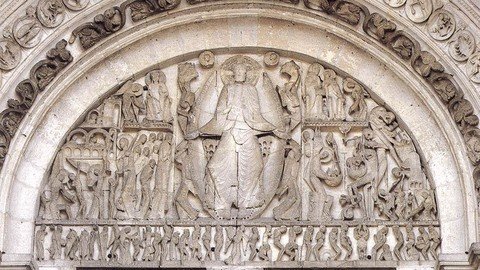
Last updated 7/2018
MP4 | Video: h264, 1280x720 | Audio: AAC, 44.1 KHz
Language: English | Size: 1012.70 MB | Duration: 0h 45m
Power in Stone
What you'll learn
Students will learn the key developments, vocabulary terms, and works of art which are associated with Romanesque art and architecture.
Students will be able to recognize major Romanesque works of art and architecture.
Students will gain an appreciation of the themes that defined the Romanesque as a distinctive style and period.
A comprehensive vocabulary list is found at the end of the course.
Requirements
Students who have completed the preceding course "The Art of the Holy Roman Empire" will be able to appreciate some elements' continuity, but this course also can stand alone and provide a solid grounding in Romanesque art and architecture.
Description
Romanesque art and architecture consolidate Latin Christian religion, conquest, and power into its most permanent medium seen in Europe so far: stone. These lasting monuments and their art were designed to impress and to terrify, and a new chapter into the psychology of Christian images opens in Early Medieval Europe. The Romanesque style proliferated and united Europe Christendom into a homogenous society- in terms not only of a shared theology and intellectual climate but also shared architectural, artistic, and technological expertise. Just as the monastic and elite political stratum of Western Europe spoke the same language, Latin, so too did their architects, sculptors, and illustrators find themselves part of a continent-wide phenomenon which defined its time period and whose forms remain clearly distinguishable today. With the Carolingian, Ottonian, and other dynasties' alliance with the Church of Rome and their rise to new titles and power in Europe of the ninth and tenth centuries, the construction of permanent, massive stone monuments of church and state ushered in a new era of architecture and its associated decorative arts in Western Europe. In the lands farthest from Rome, Italy, and the oldest churches of the Late Roman Empire, these stone monuments- whether they took the form of defensive fortifications or churches- introduced these imposing forms where nothing similar had existed before.
Overview
Section 1: Introduction
Lecture 1 Stone, the New Language of Power
Section 2: Art and Architecture
Lecture 2 Art for the Elite: Technology and Reliquaries
Lecture 3 Romanesque Sculpture
Lecture 4 Medieval Christian Art's Reign of Terror
Lecture 5 A New Kind of Church Architecture with Course Vocabulary Review
High school, university, and graduate students will find both a review of key pieces and developments as well as original research and connections which are exclusive to this course.
Homepage
https://www.udemy.com/course/essentials-of-romanesque-art-architecture/
https://rapidgator.net/file/2f8fa98699a86e84a59807fc3e43e40b/jqogc.Essentials.Of.Romanesque.Art..Architecture.part1.rar.html
https://rapidgator.net/file/9478aa205f48a6116741b58c5d2dd1d5/jqogc.Essentials.Of.Romanesque.Art..Architecture.part2.rar.html

https://uploadgig.com/file/download/45ab1eC76f4db1d2/jqogc.Essentials.Of.Romanesque.Art..Architecture.part1.rar
https://uploadgig.com/file/download/c7e094Bfaf80df82/jqogc.Essentials.Of.Romanesque.Art..Architecture.part2.rar

https://nitroflare.com/view/1E0970C6358747A/jqogc.Essentials.Of.Romanesque.Art..Architecture.part2.rar
https://nitroflare.com/view/59A4FCD346A86F8/jqogc.Essentials.Of.Romanesque.Art..Architecture.part1.rar
